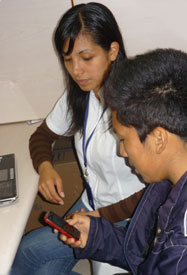Managing diabetes with mobile health tools in Peru
January / February 2012 | Volume 11, Issue 1

Photo courtesy of Dr. Ernesto Gozzer
Mobile health tools are proving to be useful in managing diabetes, even in developing countries. Dr. Ernesto Gozzer, a researcher at the Universidad Peruana Cayetano Heredia in Peru, said a recent study showed a text messaging program increased the likelihood participants would take their medication as prescribed.
Peru has some two million diabetics, though half of them are unaware of their diagnosis. In the study, 34 patients at a public hospital in Lima were randomly assigned to an intervention or control group by ballot. The 17 diabetic patients in the intervention group - in addition to conventional treatment - were enrolled to use C@reNet, which sent them text messages related to their risk factors, drug intake reminders, lab tests and medical appointments. A typical risk factor message would encourage a patient to "walk briskly 30 minutes a day, five times a week."
This was the first mHealth tool to address the comprehensive care of diabetics, or any chronic patients, in Peru and one of the first of its type in Latin America. Two outcome measures were recorded: adherence to the prescribed medication regimen and the glycated hemoglobin (HbA1c) levels. Nearly twice as many patients who received the SMS intervention took their meds according to their prescription. But there was no statistically significant difference in the glycated hemoglobin levels between the two groups. Additionally, the better educated and those "not feeling depressed" were more compliant with treatment.
Gozzer concluded that C@reNet "seems to be an easy to use and effective tool to improve treatment adherence." Due to the relatively small sample size, Gozzer is recommending another, larger study that may also be used to measure cost-effectiveness. "mHealth tools should be designed with a systemic approach and take into account that technology helps, but the human factor is key for success," Gozzer said.
The C@reNet project was funded by the Peruvian government and was implemented by Universidad Peruana Cayetano Heredia in partnership with the technology company Voxiva.
More Information
To view Adobe PDF files,
download current, free accessible plug-ins from Adobe's website.